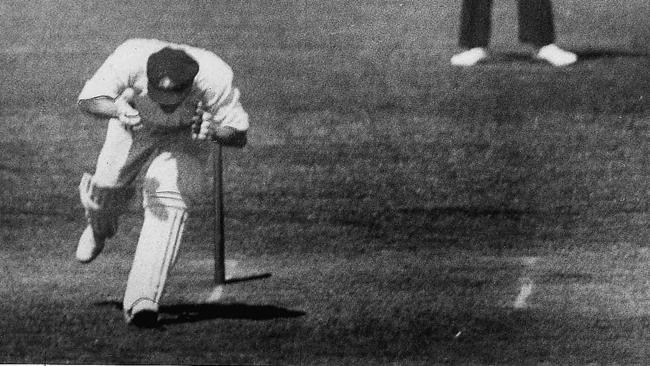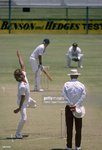
He was very much my next pick. It was so late in the draft I just assumed he'd gone under the radar
Very nearly passed over McCabe for fear of losing him to one of yous. Ended up getting them both eventually.


He was very much my next pick. It was so late in the draft I just assumed he'd gone under the radar


My picks are Sid Barnes and Wilfred Rhodes (writeup later)..

It is often said that the best players are often those that leave you wanting more. This old cliche couldn't have applied more to any one individual than Sidney Barnes, the opening batsman from New South Wales who shared remarkable similarities with the legendary Englishman Sydney Barnes both in name and in regards to off-field controversies. Barnes played a grand total of just 13 Tests over a 10-year career but left an indelible mark from the few opportunities he got, averaging a staggering 63.05, which extended to 71.38 as opener - the second highest batting average ever recorded by an opening batsman with a minimum of 500 runs in Tests behind the great Barry Richards (72.57), and the fourth highest overall among batsmen with a minimum of 10 innings at Test level after Don Bradman (99.94), Stewie Dempster (65.72) and Steve Smith (63.24). To show this was no fluke, he also scored 6582 runs at 62.09 at First Grade Level, where even Bradman averaged only 89.47 compared to a Test batting average of 99.94, putting himself on par with some of Australia's most cherished opening batsmen such as Victor Trumper (9244 runs at 62.03), Bob Simpson (10188 runs at 60.28) and Archie Jackson (3084 runs at 58.18) in the competition. Of the three Ashes series he played, he finished second on averages to Bradman in 1946/47 with 73.83 to the latter's 97.14, but actually managed to beat him in 1948 where he averaged 82.25 to Bradman's 72.57 - thus making him the only Australian batsman apart from Archie Jackson, Bill Ponsford and Arthur Morris to finish ahead of 'The Don' in terms of batting average in a Test series.
Early in his career though, he made his name as an attacking middle-order batsman and part-time leg break bowler with a brash confidence that almost bordered on arrogance in his ability. In just his second season of first-class cricket in 1937/38, he totalled 800 runs at 50.56 with 1 century, which he managed despite bleeding profusely after being struck on the jaw by Test fast bowler Ernie McCormick; another century against Western Australia which ought to have been his first was removed as a result of the NSWCA retrospectively deeming the match as a non first-class fixture much to Barnes' anger. Nevertheless, his performances so early in his career were enough to earn him a call-up to the Australian Test side which toured England to contest the 1938 Ashes. Though unbeknownst to anybody, Barnes went into the tour with a fractured wrist which he kept secret for fear of being sent home, thereby causing him to miss half of Australia's first-class fixtures along with the first two Tests of the series. He made his Test debut in the final Test of the series, where England posted a then record total of 903/7 on the back on Len Hutton's epic 364, being forced to bowl as many as 38 overs whilst claiming 1 for 84 in the process. Australia, with both Don Bradman and Jack Fingleton unable to bat due to injury, managed just 201 and 123 in response to lose the match by a record innings and 579 runs - still the biggest innings defeat ever suffered by a team in Test history. Barnes though acquitted himself quite well given the circumstances, scoring 41 and 33 with the bat in both innings. He managed 720 runs at 42.35 for the entire tour, but had his international career put on hold for the next six years due to the onset of the Second World War - in between, he managed 1050 runs at 75.00 with 6 centuries for the 1940/41 season prior to enlisting in the Second Australian Imperial Force.
When cricket resumed after the War, Barnes took on a completely different identity as a batsman, changing his attacking style of play to become an obdurate opening batsman after being approached by the Australian selectors, who were unable to find a suitable opening partner for the talented Arthur Morris with regular pre-war opener Bill Brown ruled out due to injury. Despite initial misgivings, he accepted the role for it would see him coming in before Bradman in the lineup instead of after, which he described as "flat beer after champagne". He would go on to score 443 runs at 73.83 for the 1946/47 Ashes with a highest score of 234, which he made whilst sharing a record 405-run partnership with Bradman who also scored 234 in the same innings; Barnes later revealed he had deliberately thrown away his wicket to avoid outscoring Bradman. His performances in his new role were enough to force Brown to batting in the middle-order for the rest of his career, with Barnes and Morris confirmed as Australia's new Test opening pair. He toured England with Bradman's 'Invincibles' in 1948, where he continued in the same vein of form he had left off in his previous Ashes series - scoring 329 runs at 82.25 from 4 Tests; he missed one due to an injury he suffered fielding at his novel short-leg position. In six innings in the Test series, he crossed fifty four times with a highest of 141 at Lord's where he had wagered £8 at 15/1 on himself to score a century. Australia dominated the series 4-0 and went through the entire tour unbeaten to live up to the moniker of the 'Invincibles', with Barnes scoring a total of 1354 runs at 56.41 from all first-class matches. Upon returning home, he played in Bradman's testimonal match in 1948/49 where he famously walked out to bat with a miniature bat as a practical joke, and later announced a shock retirement from all cricket aged just 32 in order to focus on his business interests.
In the three years following his retirement, Australia struggled with their opening position with the formerly prolific Morris aggregating a mediocre 884 runs at 36.83 as opposed to the 1408 at 74.11 he managed until 1948, whilst Barnes' replacements in Jack Moroney, Ken Archer and Jim Burke fared no better with a combined aggregate of just 632 runs at 27.48 during this period. Barnes, now a columnist who would often criticise the Australian cricket administration was prompted to return to first-class cricket in a bid to win back his Test place after being told by ACB chairman Aubrey Oxlade that he would be judged solely on his batting performances. But in reality, he was judged on anything but his batting performances - despite recording an impressive century against Victoria and thereby being selected in the Australian Test squad to play the West Indies at home in 1951/52, he was vetoed out of the team by the ACB "on grounds other than cricketing ability" in a manner not too dissimilar from what would befall Kevin Pietersen more than half a century later. He continued to impress with the bat without any hope of a Test recall, scoring 152 against Victoria in what turned out to be his final season of first-lass cricket in 1952/53, but made the headlines for the wrong reasons when he walked out dressed as a flight assistant (pictured above) carrying several superflous items in a match against South Australia where he was acting 12th man, thereby delaying proceedings much to the annoyance of the opposing team. He then retired for good at the end of the season, saying that "his card had been marked".
Overall, Barnes scored 1072 runs at 63.05 with 3 centuries (all of them in the Ashes) from 13 Tests between 1938 and 1948, including a staggering 846 runs at 70.50 in the Ashes. Among openers with a minimum of 500 runs in the Ashes, nobody averages higher than his 77.10 from the position with the nearest rival being Herbert Sutcliffe (2708 runs at 67.70). In all first-class cricket, he scored 8333 runs at 54.11 with 26 centuries, and also claimed 57 wickets at 32.21 with his part-time leg breaks which were sparingly used at Test level where he managed only 4 wickets at 54.50 from 9 innings. He also kept wicket early in his career, managing a total of 4 stumpings at first-class level in the process. If not for his larrikin nature and outspokenness against the Australian Cricket Board, he could have perhaps added to his 13 Test caps, a number which did little justice to a player of his ability.
Playing Role
I had initially planned to select an aggressive opening batsman like Victor Trumper to complement Hobbs at the top of the order. But with my team already possessing a galaxy of attacking players in Ponting, McCabe, Miller, Gilchrist and even Lindwall to some extent, I reckoned a bit more solidity would be better up top. Barnes and Hobbs, both averaging well above 50 (77 in Barnes' case) are the two perfect men to lay a solid foundation at the top in my opinion. Besides, I couldn't resist the urge of having both Sidney and Sydney in the same lineup! (sorry to those still searching for openers)
As for the bowling, my selection of Rhodes has pretty much completed my attack and added some much needed left-arm variety to a predominantly right-handed bowling lineup. With an Ashes bowling average of 24.00, batting average of 31.01 along with the ability to open either the batting (from where he averages a stunning 42.95 in the Ashes) or the bowling, he was simply too good to ignore. But I'll deliberate more on that later, as I need some sleep now..
VC's XI
1.
Jack Hobbs
2.
Sid Barnes
3.
Ricky Ponting
4.
Stan McCabe
5.
6.
Keith Miller
7.
Adam Gilchrist
8.
Ray Lindwall
9.
Wilfred Rhodes (writeup later)
10.
Bill O'Reilly
11.
Sydney Barnes
Over to @Aislabie, again.





@VC the slogger it's your turn to end the draft!


